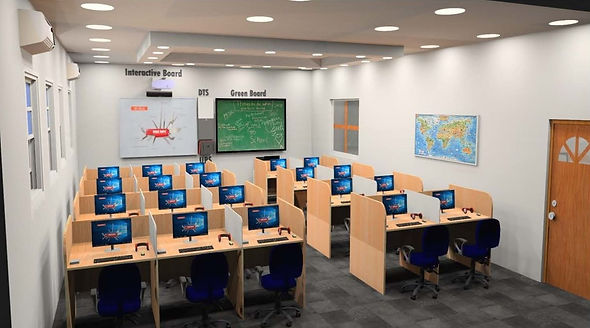
PROJECTS MENU
Projects that attract, inspire and innovate
SCIENCE LAB (PCB LAB)



School labs are a great place for students which help them enhance their learning by understanding the theoretical concepts of science which are taught in classrooms.
Well-designed laboratories not only make science experiments fun but also help students in achieving good academic results
STEM INNOVATION LAB

We make it easy to get started teaching with STEM Labs. Our project is an interactive, setup that takes STEM, Computer Science, and Computational Thinking off of the screen and brings them to life for younger students. STEM Labs are supplemental educational resources that support teachers with free, easy to follow STEM lessons and activities that align with educational standards.
ENGLISH LANGUAGE LAB



Technology plays a major role in twenty-first century education. The new model of integrating technology into the curriculum means that computers are on demand throughout the school day. Technology teachers and administrators face the task of developing a technology plan that makes the most effective and efficient use of the computer hardware available to them. The English Language Lab remains the center for most computing activity in schools. Integrated Computer lab with Comprehensive Software-based Skills Improvement Learning Programme Progressive learning from Elementary to Advanced levels (CEFR level A1 to C2) Listening skills Content rich audio/visual exercises along with classroom activities, gradually taking listening and Speaking skills from simple to complex levels. A fun-filled learning environment to generate love for the English , it is a 25 User Keys package High quality digital content that supplements the academic syllabus of schools, colleges, polytechnics and ITIs Technical and academic support and maintenance via remote assistance
DIGITAL SMART CLASS

Smart Classes use digital technology to enhance the learning process. The various audio and visual aids enhance the learning process and make it more fun. The possibilities are endless.
DEVELOPMENT OF MODEL ANGANWADI CENTRES


Anganwadi is a type of rural child care centre in India. They were started by the Indian government in 1975 as part of the Integrated Child Development Services program to combat child hunger and malnutrition. Anganwadi means "courtyard shelter" in Indian languages.
A typical Anganwadi centre provides basic health care in a village. It is a part of the Indian public health care system. Basic health care activities include contraceptive counseling and supply, nutrition education and supplementation, as well as pre-school activities.ill The centres may be used as depots for oral rehydration salts, basic medicines and contraceptives. These centres provide supplementary nutrition, non-formal pre-school education, nutrition and health education, immunization, health check-up and referral services of which the last three are provided in convergence with public health systems
DEVELOPMENT OF LIBRARY


“The reading of all good books is like conversation with the finest people of past centuries”
In the ever-expanding age of globalization, Yash Enterprises offers the community with extensive materials and a comfortable environment. Since our foundation, we’re proud to be a positive resource for our patrons .Our Library is a hub that contributes much more than just a space for reading. We provide access to quality ideas, information, fun, and experiences that support and enrich lives for people of all ages, abilities, and means through reading. Keep browsing through our site to learn more about projects.
DEVELOPMENT OF MODEL MODEL PRIMARY SCHOOLS






The International Standard Classification of Education considers primary education as a single phase where programmes are typically designed to provide fundamental skills in reading, writing, and mathematics and to establish a solid foundation for learning.
In most parts of the world, primary education is the first stage of compulsory education, and is normally available without charge, but may also be offered by fee-paying independent schools.
The building providing the education has to fulfill the needs of: The students, the teachers, the non-teaching support staff, the administrators, and the community. It has to meet general government building guidelines, health requirements, minimal functional requirements for classrooms, toilets, electricity, and services, preparation and storage of textbooks, and basic teaching aids.
